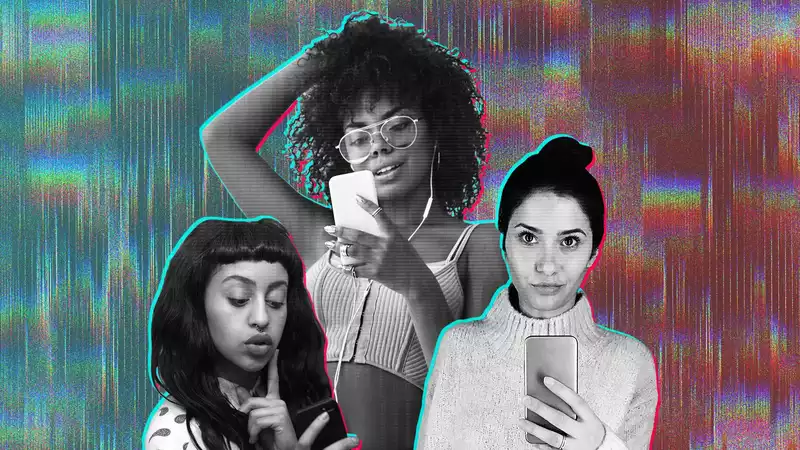
TikTok is now the official app of skin care truthers.
For years, I viewed TikTok as a "singing app"; having worked at Snapchat, I had to do some reconnaissance on what teenagers were interested in. Watching Disney lip-sync for five minutes made me feel like a voyeuristic Methuselah. Fearing that I would eventually get an "Ok Boomer" push notification, I archived the app and designated it in my mind as one for young people who enjoy choreography. Since I don't sing or dance, I figured I didn't need an app that emphasized these skills; it was only recently that a friend told me about a community of dermatologists who use TikTok to educate the masses.
Unlike other social apps, TikTok does not require you to follow someone to see their content, while Snapchat focuses on content creation by opening on camera and Instagram requires you to follow people to generate a main feed, TikTok takes a cue from streaming platforms. When you open the app, you get a "For You" page, where content auto-plays faster than Netflix and with zero chill; a 14-year-old dancing, a chef creating recipes, memes sent to increasingly frustrating text threads, and, surprisingly, a growing community of dermatologists.
Wanting to take control of my algorithm, I decided to seek out doctors, chemists, and estheticians, diving into TikTok's endless personalized scroll and discovering that every time I engaged with skincare content, more posts about pores would appear. What I found were experts debunking skincare trends rather than Reddit's hallowed Skincare Addiction; curious about how to use TikTok's editing tools, I decided to follow just four other users and take a few test shots. This was a mistake.
Within a week, I had over 400,000 views and received many "thank yous" and "fuck yous" regarding my retinol journey, Bon Appetit lemon brown butter pasta, and low molecular weight hyaluronic acid instructional videos. This last one was my first skincare video, and while the title was half-joking (in fact, I don't believe hyaluronic acid universally ruins skin), it was a chance to learn that there is no such thing as "test content" on TikTok. Any combination of timing, trends, and hashtags can make any product sell explosively. This is why a growing community of dermatologists has chosen TikTok as their platform of choice.
I first became aware of Dustin Portela (@208skindoc), a dermatologist living in Idaho, when I saw him doing a "duet" with another TikTok user. (A duet is when you post your own reaction to a video posted by another user.) In this video he accused the influencer of not fully understanding the difference between cetyl alcohol and denatured alcohol (one is fatty and is found in most skin care products, the other is not). In today's skincare world of questionable advice and #advertising, getting into Dr. Portela's perspective was like entering the text of a secret dermatologist group. I've seen doctors bemoan influencer culture and irrational clean beauty worship before, but this unfiltered correction was raw, direct, and more interesting than the tempered version I saw on Instagram. Was this what accountability in social media was all about?
"Instagram remains a highly curated platform, but TikTok is off-the-cuff," Dr. Portela explains. Given that Instagram can sometimes feel like an aesthetic LinkedIn, it was surprising to see Dr. Portela on TikTok wearing a wig made of paper towels and impersonating an influencer selling expensive skin care across platforms. Recognizing the app's potential to reach people by incorporating humor and personality into education, he has taught thousands of teens (and this 33-year-old) how to take better care of their skin. As someone who writes articles on beauty and is in the early stages of becoming a licensed esthetician, it is refreshing to see science go viral. Seeing dermatologists respond in a very human way to influencers who bemoan parabens and praise essential oils feels like vindication. While other platforms rarely hold creators accountable, it feels fitting in the age of COVID-19 conspiracy theories to see doctors reveal what is scientifically correct and what is marketing in a scalable and public way.
Dr. Joyce Park (@teawithmd), another dermatologist on TikTok, cites this kind of engagement as the reason she ultimately joined the app: "On Instagram, you get curated content from the people you follow, and you can see the content from the people you follow. content, whereas on TikTok, theoretically, you are delivered endless content based on what you like. After five years on Instagram, Dr. Park has about 45,000 followers, but after only two months on TikTok, Dr. Park has over 122,000 followers. Unlike me and Dr. Portela, Dr. Park is drawn to dance, teaching skin care tips and debunking myths.
I still have concerns about TikTok. Although it is a perfect vortex of content that sucks you in, I am concerned about how my information will be used and that I am participating in an app that, according to a report in The Intercept, actively censors poor, disabled, and "ugly" people in order to encourage more downloads. I'm worried that I'm not. It is a darkly dystopian corporate charter. Yet, in a world where most influencers outnumber followers of doctors and scientists, the accountability I see on TikTok is refreshing. Being clear about how I structure my content and where and how I source it is different from how I usually create content on other platforms. It's also nice to see factual and science-based content go viral, even if it's aimed at "young people."
To read more stories like this, including celebrity news, beauty and fashion advice, savvy political commentary, and fascinating features, sign up for the Marie Claire newsletter.
Click here to sign up (opens in new tab)
.
Comments